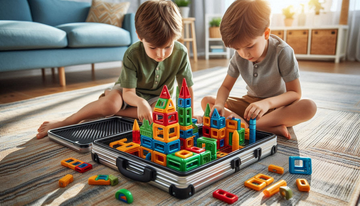Drones are no longer just high-tech gadgets for professionals; they've become an exciting and educational toy for children as well. Kids’ drones, specifically designed for younger users, have opened up a whole new world of exploration, learning, and fun. In this blog, we’ll explore why kids playing with drones is not only enjoyable but also beneficial for their development.
1. Encouraging STEM Learning Through Play
One of the most significant benefits of kids playing with drones is the opportunity for early exposure to STEM (Science, Technology, Engineering, and Math) concepts. Operating a drone involves understanding basic physics, such as how gravity and lift work. Children learn about aerodynamics, how wind can affect flight, and the importance of precise control.
Learning Through Experience: As kids fly drones, they gain hands-on experience with concepts they might encounter later in school. They begin to understand the cause-and-effect relationship by observing how different commands influence the drone's movement. This kind of interactive learning helps to solidify their understanding of these principles in a fun and engaging way.
Problem-Solving Skills: Drones often require troubleshooting when things don’t go as planned. Whether it’s navigating obstacles or correcting flight patterns, kids are prompted to think critically and solve problems, enhancing their cognitive development.
2. Boosting Spatial Awareness and Coordination
Flying a drone requires a good sense of spatial awareness and hand-eye coordination. As children manipulate the controls to navigate their drones through various spaces, they develop a better understanding of distance, direction, and space.
Improving Coordination: The act of controlling a drone improves hand-eye coordination as children learn to sync their movements with what they see on the screen or in real life. This coordination is essential for many daily activities and other sports or hobbies they might pick up later in life.
Understanding Space and Movement: Drones help kids visualize and understand how objects move through space. They learn to judge distances and angles, improving their ability to navigate both the real and virtual worlds.
3. Enhancing Creativity and Imagination
Kids' drones come in various designs, often with cameras and features that allow children to create and capture their own content. This encourages creativity as they experiment with different aerial shots, angles, and even storytelling through video.
Creative Exploration: Drones allow children to explore their surroundings from a bird’s-eye view, giving them a new perspective on familiar places. This can spark their imagination as they think about how to capture the best shot or what story they want to tell through their drone footage.
Innovative Play: With drones, kids can invent new games and challenges, such as obstacle courses or treasure hunts, where they use their drone to find hidden objects. This type of play fosters innovation and creative problem-solving.
4. Promoting Responsibility and Discipline
Operating a drone comes with responsibilities. Children learn the importance of following rules, such as respecting no-fly zones and understanding the safety measures necessary to operate a drone responsibly.
Learning Responsibility: Managing a drone teaches children about the consequences of their actions. They learn to be careful and considerate, understanding that reckless flying can lead to accidents or damaged equipment. This sense of responsibility can translate into other areas of their lives.
Building Patience and Focus: Flying a drone successfully requires patience and focus. Kids must learn to control the drone steadily, especially when trying to land or navigate through tight spaces. These skills help improve their attention span and ability to concentrate on tasks.
5. Encouraging Outdoor Play and Exploration
In today’s digital age, it’s essential to find activities that encourage children to go outside and explore. Drones offer a perfect blend of technology and outdoor play, motivating kids to leave their screens behind and engage with the real world.
Outdoor Adventure: Flying drones gives children a reason to explore parks, fields, and other outdoor areas. They can discover new places to fly, learn about their environment, and develop a love for outdoor activities.
Family Bonding: Drones can also be a great way for families to spend time together. Parents and children can collaborate on flight paths, capture scenic videos, and enjoy the excitement of flying a drone. This shared activity strengthens family bonds and creates lasting memories.
6. Developing Social Skills Through Group Play
When children play with drones in groups, they have the chance to interact, communicate, and collaborate with their peers. Whether it’s through racing drones or working together to complete a flight challenge, these activities help develop social skills.
Teamwork and Collaboration: Kids learn the value of teamwork as they plan and execute drone activities together. They practice communication, negotiation, and cooperation—skills that are vital for their social development.
Healthy Competition: Drone racing or other competitive games encourage a healthy sense of competition. Kids learn how to handle winning and losing gracefully, building sportsmanship and resilience.
Conclusion: Drones as Tools for Growth and Fun
Kids' drones are more than just toys; they’re tools for learning, creativity, and development. By flying drones, children can enhance their STEM knowledge, improve their coordination, spark their imagination, and learn responsibility—all while having a great time. As technology continues to advance, drones will likely play an even more significant role in education and play, making them a valuable investment in a child’s growth.
Encouraging children to explore the skies with a drone is a fantastic way to blend fun with learning. As parents and guardians, you can feel confident that you're providing your child with a toy that not only entertains but also helps them grow into curious, responsible, and creative individuals.










